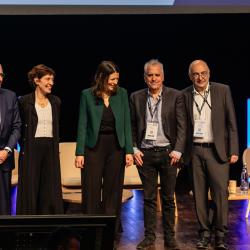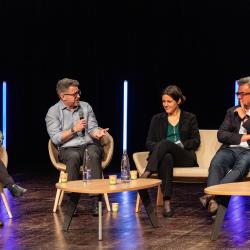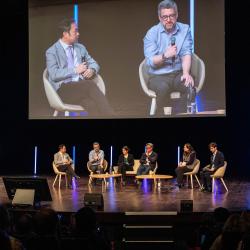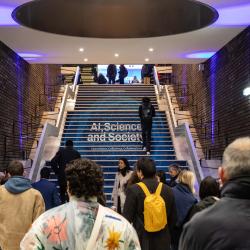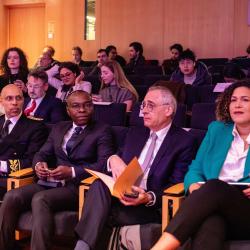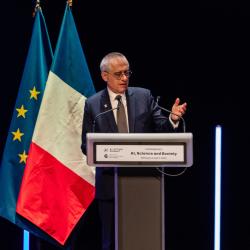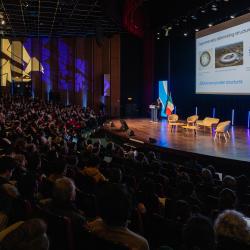Science Sheds Light on the Debate at the AI Action Summit
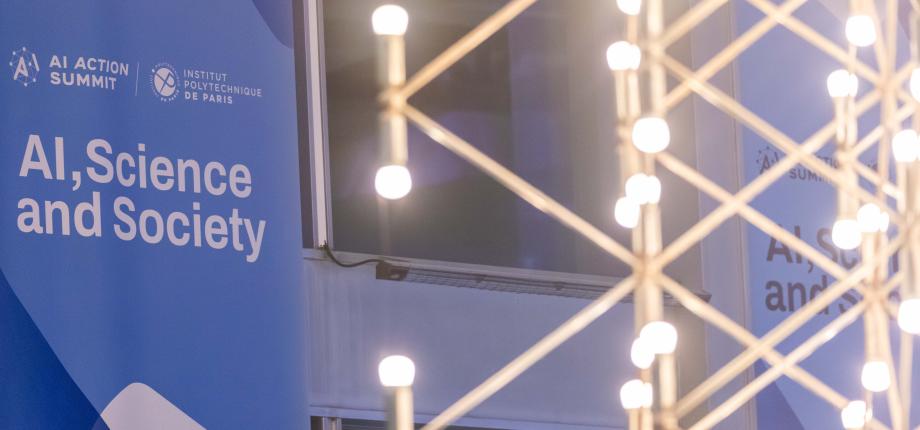
The conference titled "AI, Science, and Society," marks a decisive step in structuring the global debate on artificial intelligence. Never before had so many influential researchers gathered in one setting to jointly discuss the strategic challenges of AI.
This unique event provided an overview of AI research "in progress" while engaging in an in-depth scientific reflection on its major societal implications.
With an unprecedentedly rich program, the conference featured 94 speakers across 12 plenary sessions, 9 keynote speeches, 7 specialized symposiums, and 9 roundtables. More than 3,800 participants attended the discussions and presentations, including researchers, educators, students, businesses, entrepreneurs, and numerous national and international institutions and organizations such as the UN, the OECD, and the National Commission for AI. The event also benefited from the active participation of several ministries and French and foreign embassies, demonstrating its reach and impact.
The event was inaugurated on February 6 by Anne Bouverot, the President's special envoy for the AI Action Summit, Thierry Coulhon, President of Institut Polytechnique de Paris, and Laura Chaubard, President of École Polytechnique.
Three French ministers were also present during the two-day event: Clara Chappaz, Minister Delegate for Artificial Intelligence and Digital Affairs; Philippe Baptiste, Minister of Higher Education and Research; and Thani Mohamad Soihili, Minister Delegate for Francophonie and International Cooperation.
Between technological breakthroughs, governance, and societal transformations, this conference laid the groundwork for a structured reflection that will influence public policy and industrial innovation. Here is a look back at the key moments:
Towards a More Collaborative and Efficient AI
One of the central themes of these Science Days was the need to rethink the structure of artificial intelligence models. Michael Jordan advocated for a multi-agent approach inspired by economics, emphasizing collaboration. On the topic of regulation, Professor Jordan stated:
"Sociotechnical systems must be regulated at the level of their equilibria, not at the level of the underlying algorithms." – Prof. Michael Jordan, Professor at UC Berkeley / Inria
Meanwhile, Yann Le Cun called for the development of AI capable of learning and reasoning autonomously, surpassing the mere massive memorization of data.
"Machine learning, in its current form, is limited. What we must aim for is an AI that builds a true representation of the world, allowing it to learn, reason, and plan." – Yann Le Cun, Chief AI Scientist at Meta
The question of Artificial General Intelligence (AGI) also sparked intense debate. A consensus emerged: AGI does not yet exist and may never come to fruition in its classical definition. Bernhard Schölkopf emphasized the need for a paradigm shift towards a more hybrid AI, integrating causal principles to better understand and interpret the real world.
AI Serving Science: A Revolution Underway
AI already plays a crucial role in various scientific fields. Joëlle Barral from DeepMind retraced the evolution of AlphaFold, which revolutionized structural biology by predicting protein structures with unprecedented accuracy.
Other spectacular advances were presented, notably in astronomy, physics, medicine, and chemistry. Emmanuel Candès unveiled a new mathematical reasoning model capable of rivaling traditional approaches while requiring 1,000 times fewer training data.
In biology and healthcare, Jean-Philippe Vert (Owkin, Bioptimus) and Karim Beguir (InstaDeep) demonstrated how AI can model complex biological interactions to accelerate the discovery of new treatments.
Governance and Regulation: What AI for Tomorrow?
The challenges of AI regulation and governance were the subject of passionate debates. Danielle Allen, philosopher and political scientist at Harvard, defended a democratic and inclusive approach to AI governance, rejecting purely technocratic or capitalist models.
"We must go beyond mere AI safety. The real question is how to design systems that truly serve citizens and strengthen democracy." – Danielle Allen, Harvard University
The debate also touched on the openness of AI models. A majority of scientists advocated for open-source and transparent AI to prevent excessive concentration of power in the hands of a few large tech companies.
AI, Economy, and Productivity: What Impact?
Artificial intelligence is transforming the world of work and productivity, with varying effects across sectors. Eric Brynjolfsson emphasized that AI accelerates certain processes, particularly in coding and research, but that its macroeconomic impact will largely depend on accompanying public policies.
"Technology alone is not enough to create growth. AI must be supported by appropriate education and public investment policies." – Eric Brynjolfsson, Stanford University
Philippe Aghion, on the other hand, offered a more optimistic view, highlighting that AI could become an innovation accelerator, particularly in the discovery of new materials and the design of new products.
"AI accelerates ideation and creativity, which are at the heart of breakthrough innovation." – Philippe Aghion, Collège de France
A More Responsible and Sustainable AI: A Key Challenge
Finally, the environmental impact of AI was at the heart of discussions. The energy consumption of foundation models and LLMs is raising increasing concerns. Emerging solutions include frugal models capable of delivering equivalent performance with a reduced carbon footprint.
Gersende Fort and Vianney Perchet presented major advances in designing more efficient algorithms, while Francis Bach detailed research aimed at optimizing diffusion models, now used for image generation.
A Conference That Paves the Way for Major AI Decisions
The Science Days of the AI Action Summit laid the groundwork for a crucial reflection on the future of artificial intelligence. By emphasizing collaborative, responsible AI geared towards social well-being, the event set the stage for discussions that will take place at the AI Action Summit at the Grand Palais.
"AI is a powerful tool, but it should not be left solely in the hands of engineers and companies. Its regulation and development must be a matter for the whole of society." – Bernhard Schölkopf, Max Planck Institute
The AI, Science, and Society conference paved the way for crucial debates that will continue at the AI Action Summit. By focusing on collaborative AI and social well-being, IP Paris and all AI Clusters reaffirmed their commitment to responsible and impactful AI.
📺 Watch the conferences:
Day 1: YouTube Link
Day 2: YouTube Link














